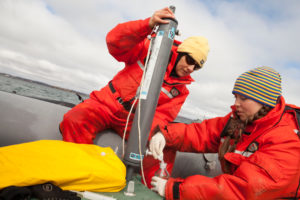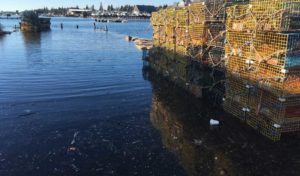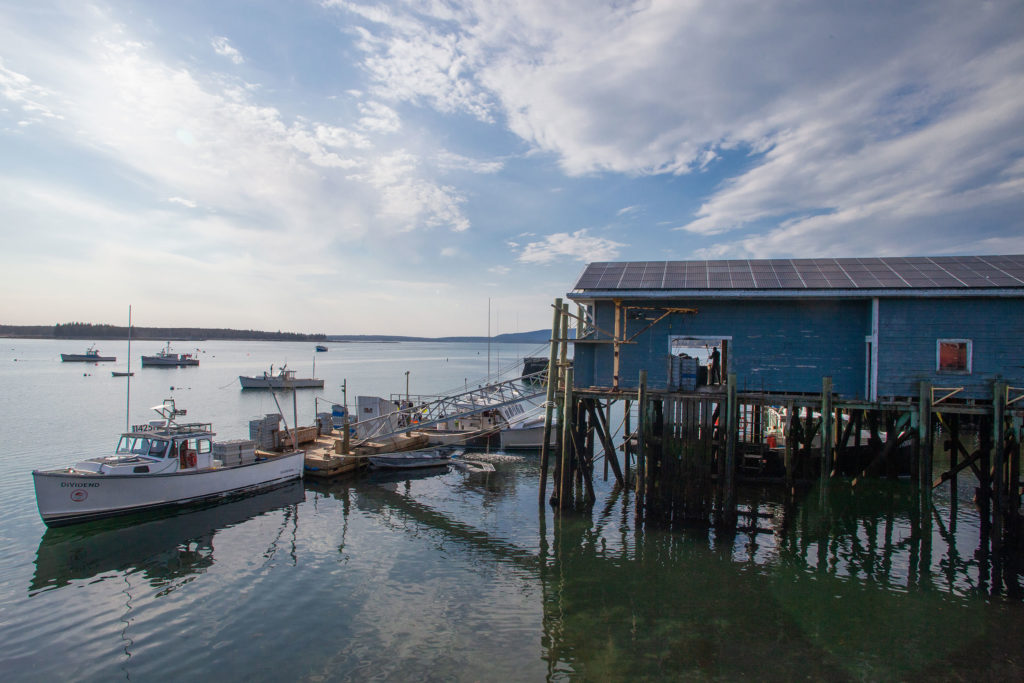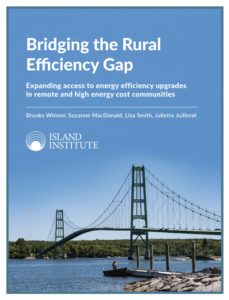Island and coastal communities are on the front line of environmental changes associated with climate change. While Maine island residents were already paying some of the highest energy costs in the nation, our working waterfronts are now facing significant threats from climate-related issues and economic challenges.
With a strong history of helping island communities in their weatherization and community energy projects, the Island Institute is exploring energy efficiency and renewable energy opportunities as one important path to increasing climate and economic resilience along our state’s working waterfronts.
Through our Climate and Energy work, we strive to increase the economic and social resilience of Maine’s island and coastal communities as they confront and prepare for a changing climate. We provide support for island communities seeking to better understand and confront their unique energy challenges and work to reduce the cost of energy for homeowners, businesses, and municipalities through community-based, nationally relevant models that increase energy efficiency and renewable energy options.
Climate Impacts in Maine
Maine Climate Council
Since September 2019, the Island Institute’s climate work has had a major focus on the Maine Climate Council, our state’s leading climate action initiative. Four Island Institute staff members were selected by Governor Mills to serve on the Council’s working groups, providing us the opportunity to be fully engaged in helping the state take action on this issue.
Our work on the Climate Council has allowed us to highlight the lessons we have learned from working alongside coastal and island communities on climate-related issues for more than a decade. Our representation ensures that the state is keeping the needs and concerns of some of Maine’s smallest and most remote communities at the forefront.
To learn more about this work, visit our Maine Climate Council page.
Offshore Wind Power in Maine
Warming seas, ocean acidification, and other negative impacts of climate change are a serious threat to Maine’s coast, our marine economy, and the livelihoods of those who live and work here. Offshore wind power offers strong potential to address the climate crisis, but it also raises complex, polarizing issues about how resources are allocated and decisions are made.
- We support clean energy.
- We support Maine fishermen and the marine economy.
- We are committed to bringing people together to create the best solutions for island and coastal communities and the Gulf of Maine.
Learn more about how we’re engaging on this important issue. Read our full statement here and a recent blog post on this topic.
Working Waterfront Decarbonization
Working waterfronts—cornerstones of Maine’s island and coastal communities—are facing significant threats from climate change and economic challenges. The Island Institute is exploring energy efficiency and renewable energy opportunities as one important path to increasing climate and economic resilience along working waterfronts.
We see this effort as a climate adaptation strategy—to reduce and flatten operating costs of fishing and lobstering to make these industries more economically viable—particularly with added costs and loss of income resulting from climate change and other impacts.
We will be sharing more information as this work develops further.
Ocean Acidification

The potential impact of ocean acidification along Maine’s coast is largely unknown. With a heavy economic reliance on organisms that build shells, any changes to water chemistry can present a significant threat to the future viability of our coastal communities. For the last few years, we have been working to make sure that they are better prepared for ocean acidification.
Island Institute Marine Scientist Dr. Susie Arnold served on the Maine legislature’s Commission to Study the Effects of Coastal and Ocean Acidification, and presently serves on the Maine Climate Council’s Scientific and Technical Subcommittee where she coauthored the chapter on ocean and coastal acidification in the report: Scientific Assessment of Climate Change and Its Effects in Maine.
Ocean chemistry and our fisheries
Shell-forming species in Maine’s coastal waters, such as clams, mussels, oysters, and lobsters, are at risk due to ocean acidification. Ocean acidification is a term used to describe the changing chemistry of the ocean caused primarily by uptake of CO2 from the atmosphere. This oceanic uptake of CO2 has direct consequences on ocean chemistry, leading to decreases in pH and lower calcium carbonate saturation in surface waters, which together are referred to as ocean acidification (OA). While the pH of the ocean had held stable for over 600,000 years, in the last 200 years it has begun to decrease, and predictions of further declines over the next century raise questions about impacts on the long-term viability of our fisheries.
The potential for kelp
In 2015, the Commission issued a report identifying critical knowledge gaps in our understanding of our vulnerability, as well as ways in which we can respond, including the use of phytoremediation to reduce acidity through kelp farming. Phytoremediation is the process by which kelp takes in CO2, nitrogen, and phosphorus, and outputs oxygen, creating a “halo effect” of remediated water around the kelp farm.
That potential capacity is the focus of a research project being conducted by Dr. Arnold and Dr. Nichole Price, a marine scientist at Bigelow Laboratory for Ocean Sciences, in the waters around a kelp farm in Casco Bay. The long-term goals of the proposed work are to measure the size, impact, and permanency of OA remediation through kelp farming as a low-cost, low-risk way to enhance water chemistry while contributing to shellfish growth, increasing shellfish yield, decreasing time to market and adding a potential income stream for Maine’s fishermen.
Preliminary data indicate that phytoremediation from kelp can improve ocean acidification, although the size, relative impact, and permanency of the theoretical ‘halo’ of phytoremediated water surrounding a kelp farm is yet to be determined. Future research by Arnold and Price will focus on studying the halo effect further and examining these questions.
For more information on our ocean acidification research, contact Susie Arnold Ph.D., Marine Scientist.
Sea Level Rise

Sea level rise along the coast of Maine is increasing at a rapid rate. With the frequency of high tides and nuisance flooding growing, our island and coastal communities are on the front line of the impacts associated with sea level rise. Through our work, we know that the effects are being seen up and down our coast—from causeways flooding and main roadways becoming inaccessible to impacts on drinking water and downtown infrastructure.
The predicted impacts on homes, businesses, and critical infrastructure, including working waterfronts, could structurally change these communities and the economies along our coast. Since sea level rise affects communities in a variety of ways, how each addresses and adapts to it will require unique solutions that fit each community’s needs.
Visit our Sea Level Rise page to learn more about our work with community leaders, industry partners, businesses, and municipalities in addressing and improving their resilience to sea level rise and other climate change effects.
Sustainable Energy
One of the roadblocks to island and coastal community resiliency is the exorbitant cost of energy. Since 2013, we have worked with existing community networks to build energy efficiency education and action on islands. By pairing energy education and energy rebates for efficiency measures, we have realized $8.2M in household savings, weatherized 21% of island homes, and avoided 142,000 tons of CO2 emissions.
Our energy work continues with solar projects on lobster co-ops and other island-based businesses. We’ve just begun partnering with lobstermen, co-ops, buyers and processors to tackle the deep decarbonization of the lobster value chain. We aim to support the development of a blueprint for energy efficiency and renewable energy upgrades throughout the seafood supply chain.

Spark! Grants
The Island Institute provides grant and loan support for broadband, energy, sea level rise, and working waterfront infrastructure planning projects through the Tom Glenn Community Impact Fund.
Through our Spark! grants, we are currently offering funding for working waterfront energy projects that improve energy efficiency, focus on renewable energy, and/or reduce consumption of fossil fuels.
Eligible applicants include working waterfront businesses and entities such as: processing facilities, co-op buildings and offices, shared equipment/storage sheds/workshops, fishing vessels, and docks and yards. Applicants must be based in Maine’s island and/or coastal communities.
What can the funds be used for?
Past projects have supported the purchase of:
- Heat pumps
- Solar panels
- LED light bulbs & energy-efficient appliances
- Infrared (IR) cameras
- IR thermometers
- Kill-A-Watt meters to help residents understand their energy usage
- Weatherization materials or services: insulation, air sealing, window inserts, etc.
- Registration for conferences or trainings
- Energy audits and consulting services
Learn more about Spark! Grants here, and contact us with any questions. To apply, click here.
Bridging the Rural Efficiency Gap
Islands and other rural communities throughout the United States pay some of the highest costs for electricity and heating fuel. With such high energy costs, the financial benefits of energy efficiency can be significant, but if you live in one of these rural places, it can be difficult to find financing for energy upgrades or a contractor who will work in your area.
We call these financial and logistical barriers the Rural Efficiency Gap.
The Island Institute is working to bridge this gap, partnering with the Maine Governor’s Energy Office and a team of experts from other rural states. Project partners include: Maine Governor’s Energy Office, Efficiency Maine, Maine Office of the Public Advocate, Alaska Energy Authority, Renewable Energy Alaska Project, New Hampshire Office of Strategic Initiatives, Vital Communities, and Efficiency Vermont.
The Bridging the Rural Efficiency Gap project is designed to make it easier for residents of rural communities in oil-dependent states like Maine, Alaska, New Hampshire, and Vermont to increase the energy efficiency of their homes and lower their energy bills with the support of well-designed financing programs that work in rural places.
Read our full report and check out “Lowering Energy Costs” in our Solutions Library for case studies and practical information about how residents of rural communities have successfully addressed these common community challenges.
Community Renewable Energy
A networked approach
The Island Institute’s networked approach to energy solutions has helped Maine’s island and coastal communities better understand their unique energy challenges and transition them to clean energy systems. For the last 11 years, we have worked to reduce the high economic and environmental costs of energy use for homeowners, businesses, and municipalities through community-based, nationally-relevant models that increase energy efficiency and renewable energy options.
The program has invested in local leaders by building capacity, leveraging specialized expertise, and accelerating the sharing of best practices between remote and island communities in Maine, the United States, and internationally. We catalyze energy transitions in island and coastal communities by bridging communities of technical expertise and capacity constrained communities in ways that link locally-relevant technical support, expertise, and training to local stakeholders so they are able to prioritize, develop, and operate cleaner energy systems and share their learning.
This approach has established durable networks that support future understanding of data, decision-making, and preparation, applicable to a broad range of potential challenges that communities in Maine and beyond may face.
Local partnerships
One example of this close work with island communities to understand and address their unique energy challenges can be found on the island of Matinicus.
Matinicus Isle, 20 miles off midcoast Maine, is powered by its own utility completely separate from the mainland. Since 2014, Matinicus has partnered with the Island Institute to address the challenges related to high electric and heating fuel costs. Together, we have undertaken a number of initiatives to increase the efficiency of the island’s housing stock, and continue to address the need for more sustainable and affordable on-island power generation.
Highlights include:
-
Coordination of a Weatherization Week in 2014, an Island Institute program to facilitate the collective purchase of weatherization services for just under 20% of year-round homes.
-
Co-hosting, along with the Monhegan Plantation Power District, an Island Institute Fellow from 2014-2016. The Fellow collaborated with power company staff and town leaders to facilitate an island-wide energy use survey, a line loss study, a review of the island’s rate structure, a bulk purchase of discounted LEDs, and community outreach to identify residents’ priorities for a new power system.
-
Capacity to support the procurement of a new solar and battery storage project. As a part of this process, the Island Institute connected the Matinicus team with other island energy experts to help inform development of the process and provide feedback on bids received, which initiated interest from 15 different companies.
Community Solutions
By collecting, curating, and sharing these processes in our Solutions Library, we hope to create a resource where others undergoing similar challenges can learn from Maine’s island and coastal communities and use these methods and solutions to address their own unique needs and catalyze broader action. Continuing to share these stories, both in Maine and beyond, helps to inform a broader dialogue and creates a support network for those implementing energy transitions.
Discover the steps communities have taken to improve energy efficiency, lower energy costs, and improve sustainability and affordability for their residents and businesses. Explore “Lowering Energy Costs” in our Solutions Library to learn more.


